Abstract
Hemodynamic and hematologic changes occurring after intravascular complement activation have implicated the anaphylatoxins in this response. In this study, the hemodynamic and hematologic effects of purified C5a were investigated in rabbits; and involvement of prostanoids, histamine, and polymorphonuclear leukocytes (PMNs) were examined. The anaphylatoxin C5a induces a reversible systemic arterial hypotension which coincides with an increase in central venous pressure (CVP), decreased cardiac output (CO), increased plasma prostanoid levels, as well as neutropenia. Total peripheral resistance (TPR) remained unchanged. The cyclooxygenase inhibitor indomethacin abolished the C5a-induced hypotension and normalized plasma prostanoid levels without altering the C5a-induced neutropenia. The thromboxane (Tx) A2 synthetase inhibitor dazoxiben reduced TxB2 plasma levels and increased 6-keto-prostaglandin PGF1 alpha and PGE2 levels without altering the hypotensive response. However, with dazoxiben treatment both TPR and CVP decreased. The H2-receptor antagonist cimetidine reduced C5a-induced hypotension and diminished prostanoid release. Both the hypotensive response and elevated prostanoid release were observed after C5a challenge in animals rendered neutropenic prior to challenge. It is concluded that C5a-induced arterial hypotension in the rabbit is a PMN-independent reaction, mediated through cyclooxygenase products and, to some degree, by histamine. The mechanism producing systemic arterial hypotension does not seem to involve peripheral vasodilation but appears to be a secondary effect of pulmonary vasoconstriction, possibly mediated by TxA2.
Full text
PDF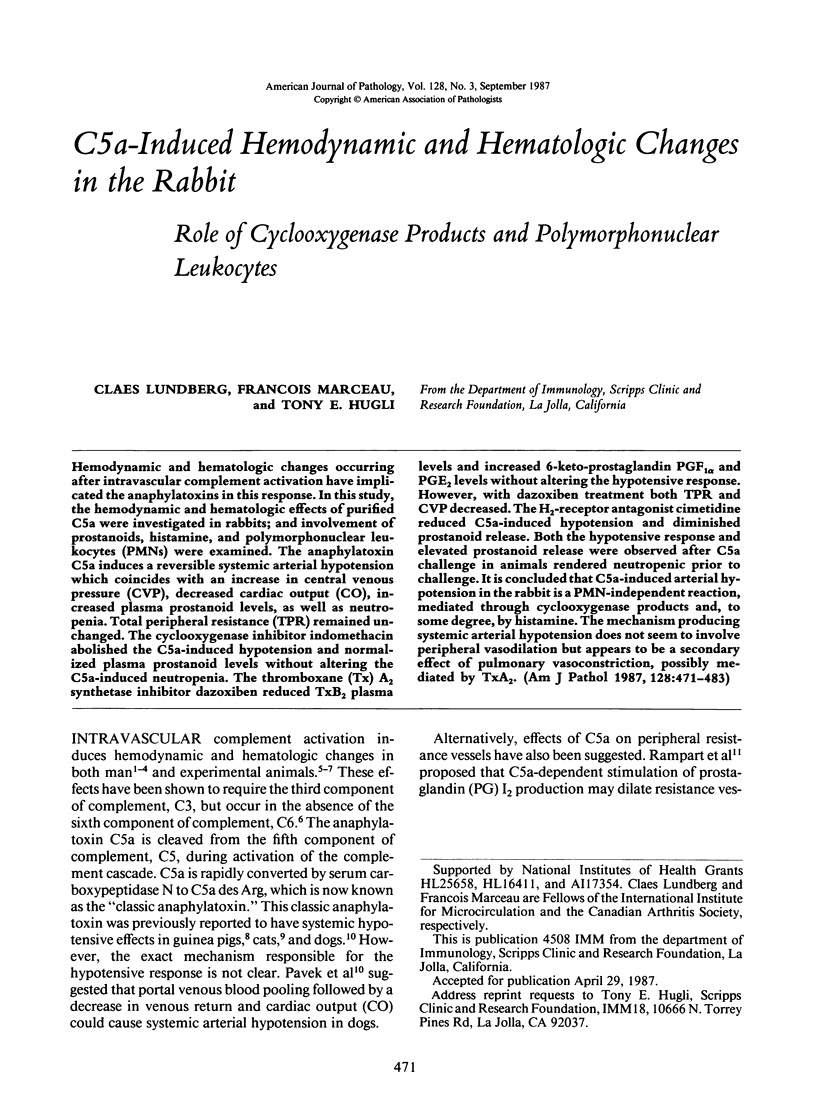
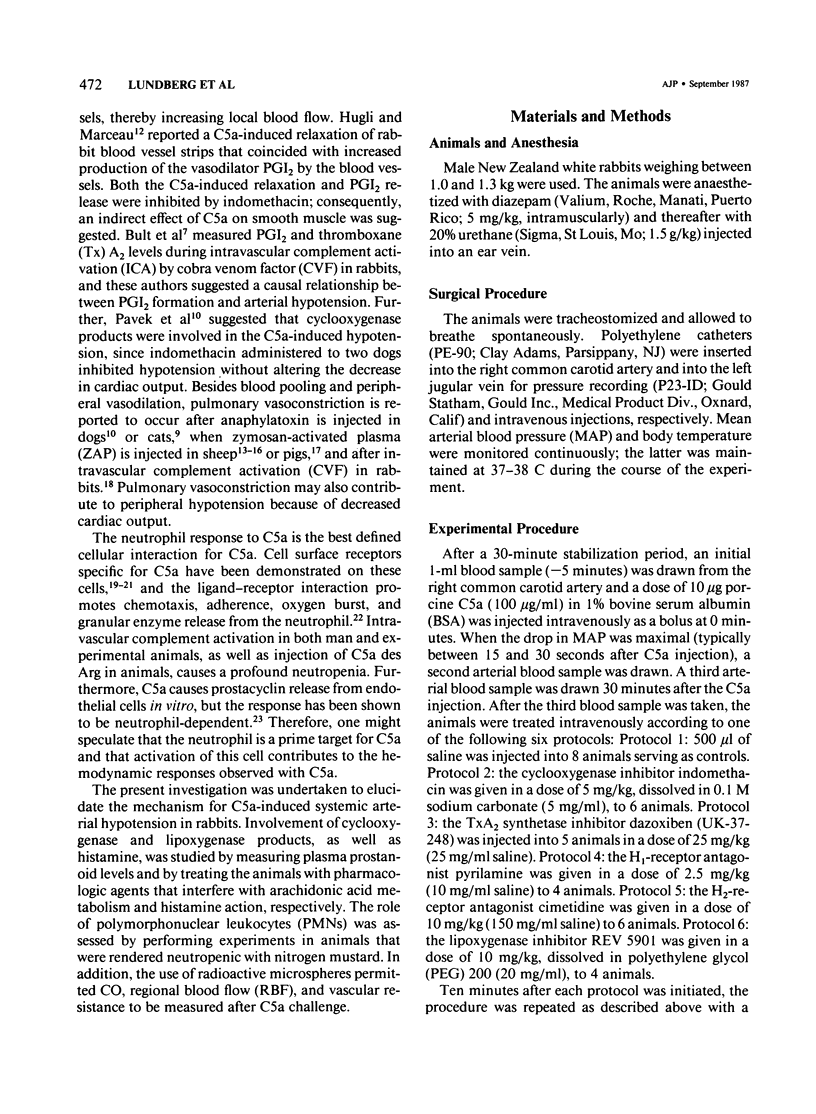
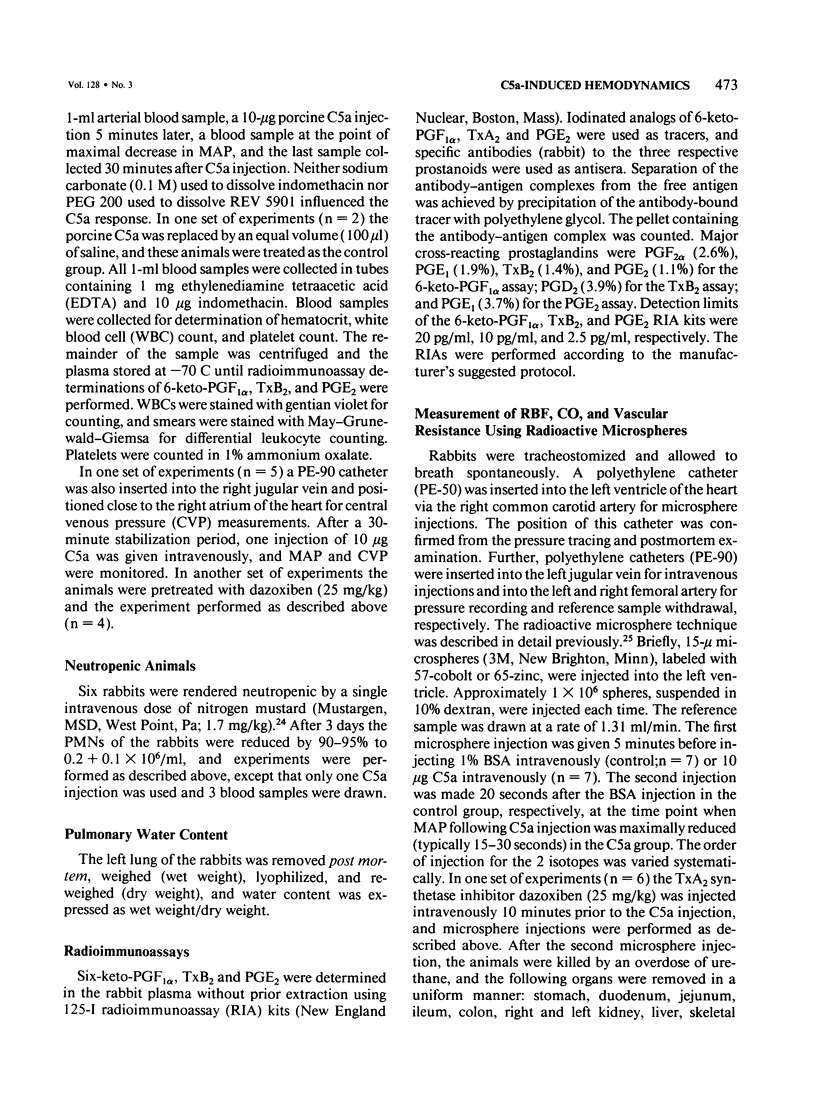
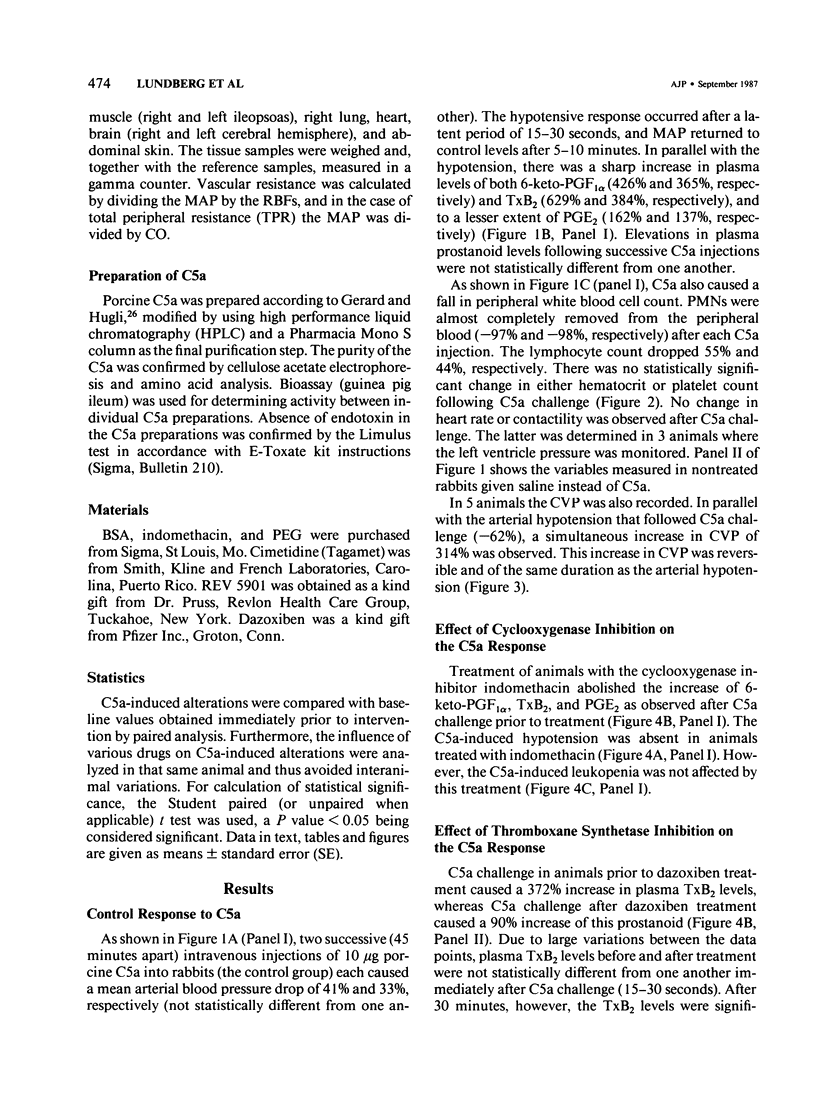
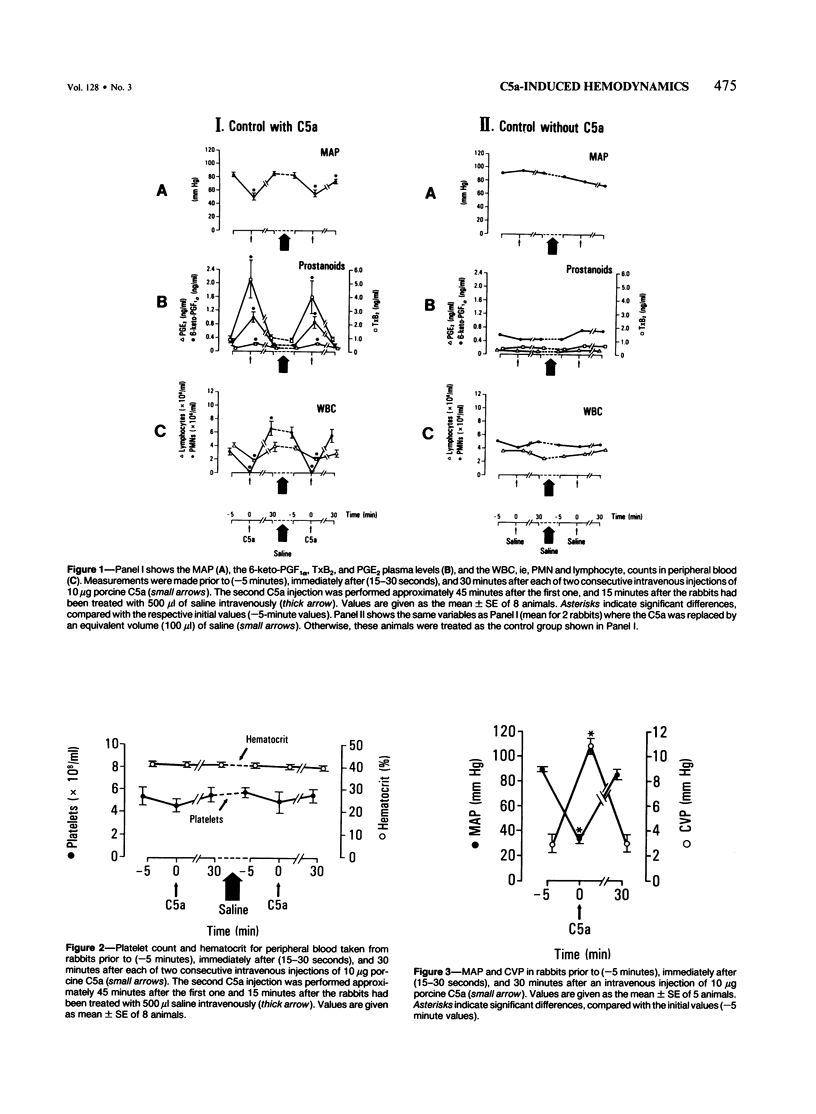
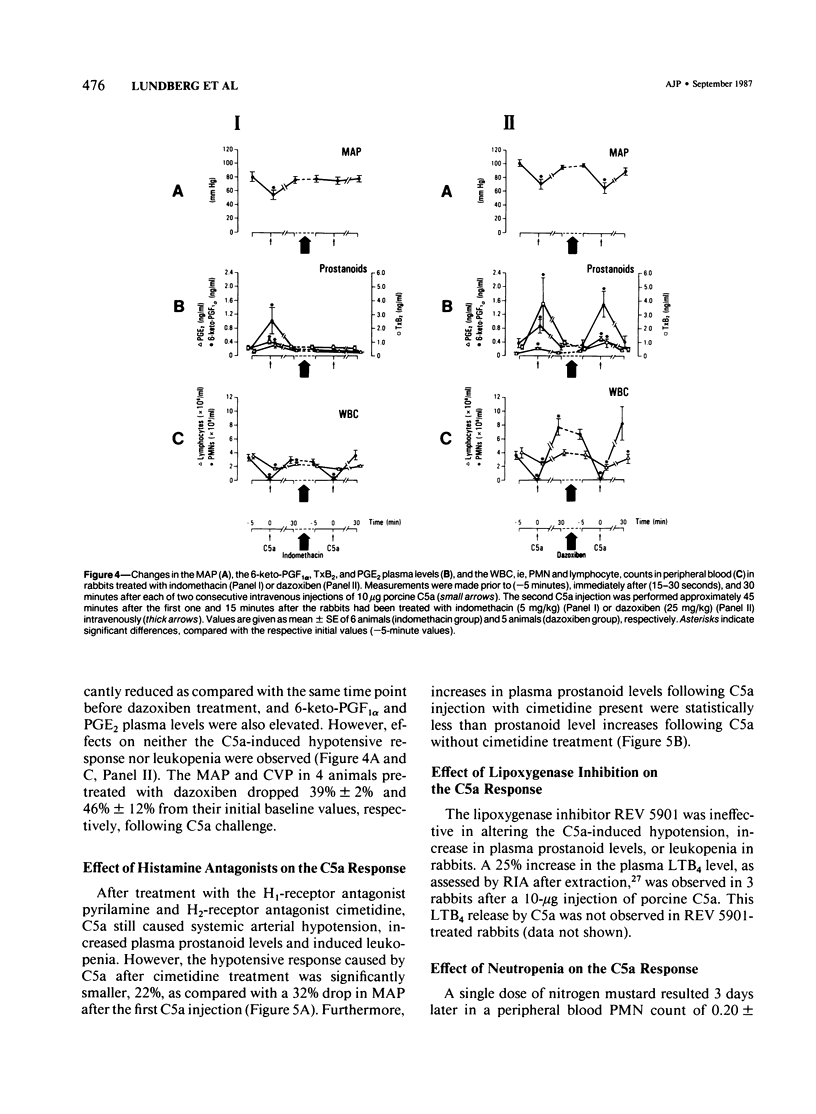
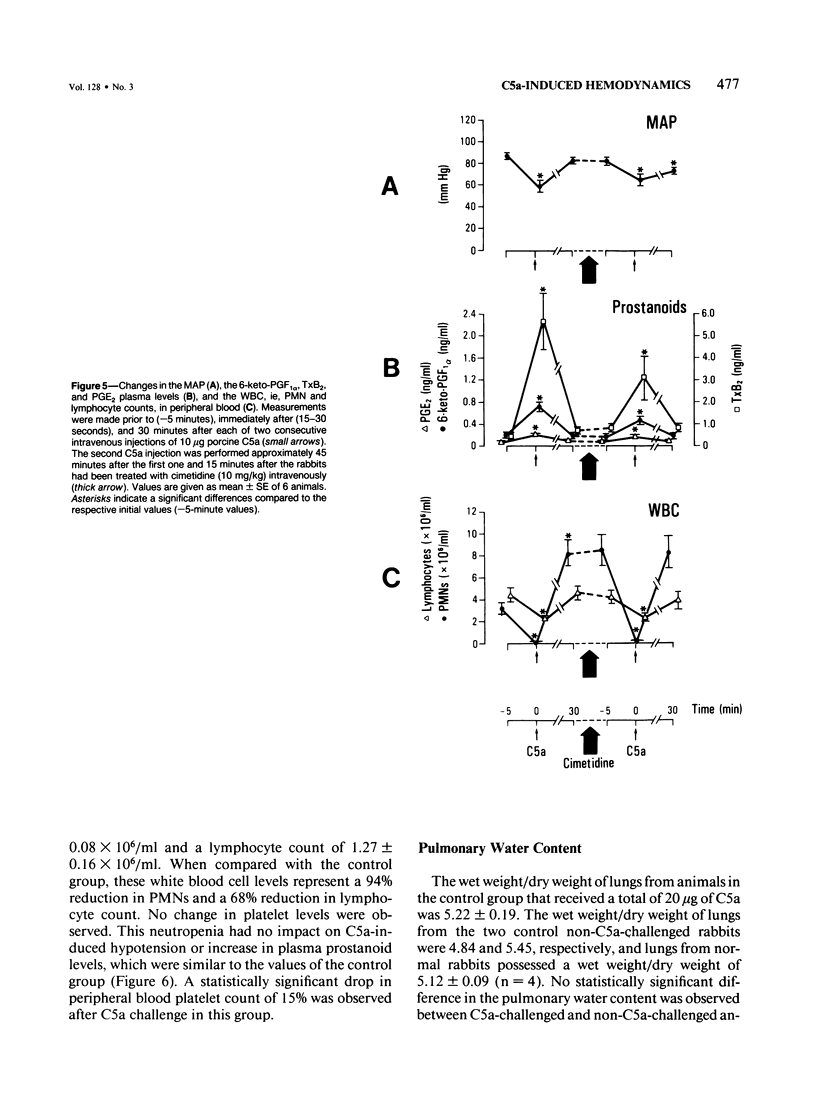
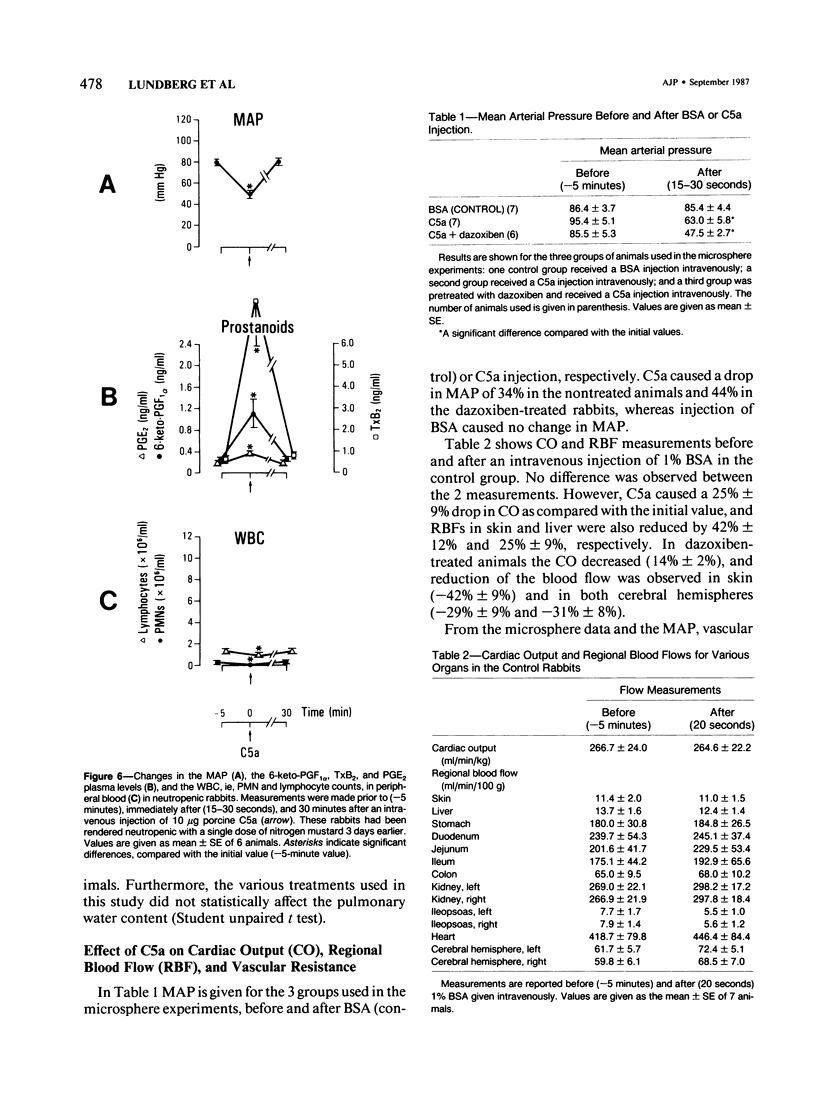
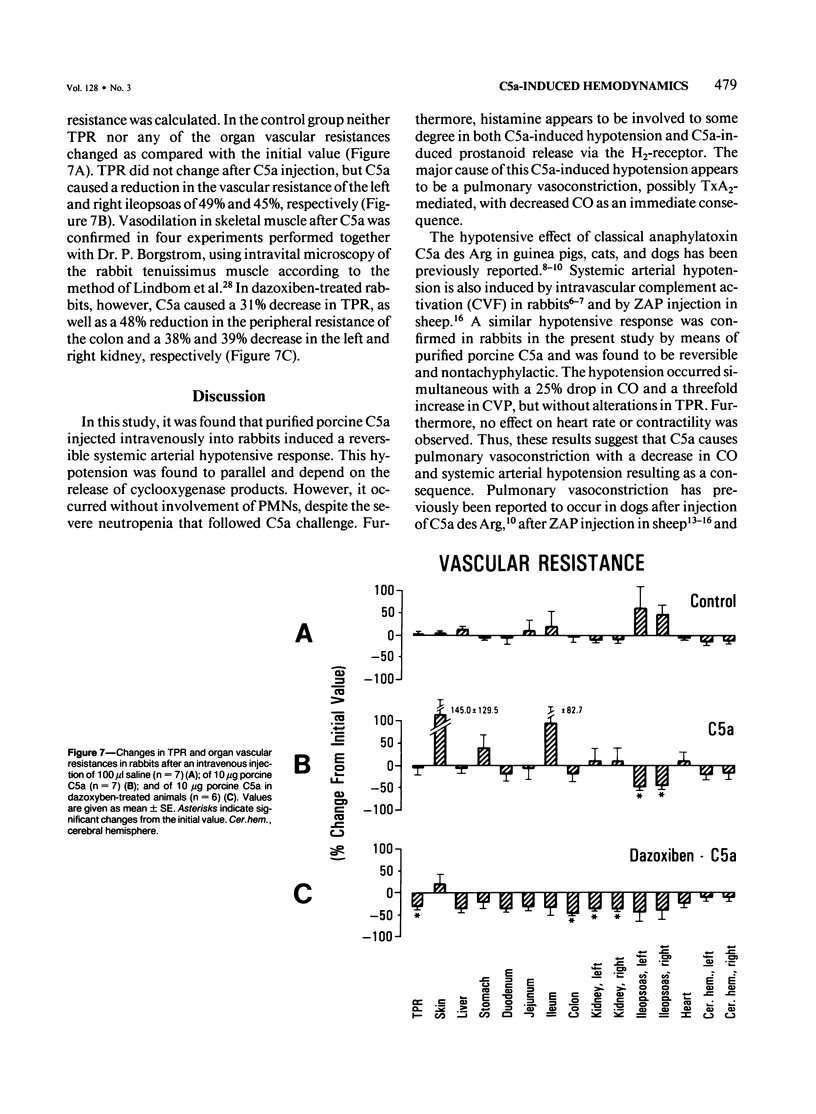
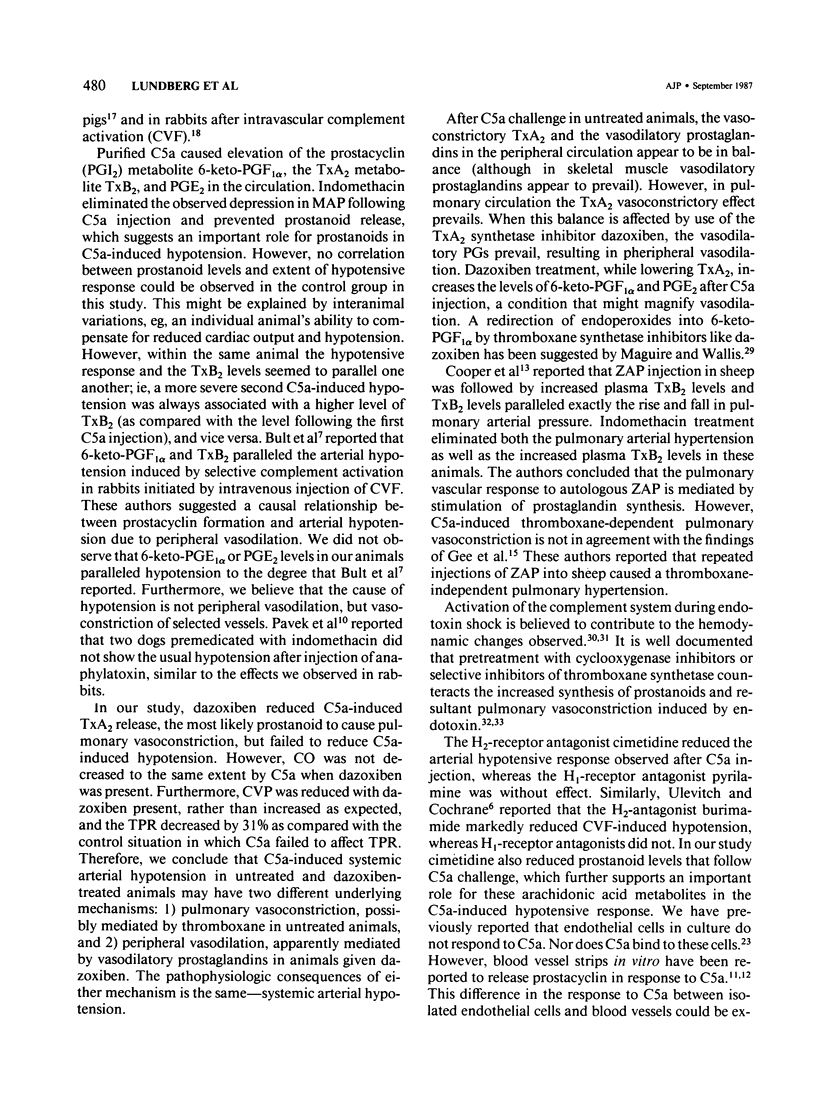
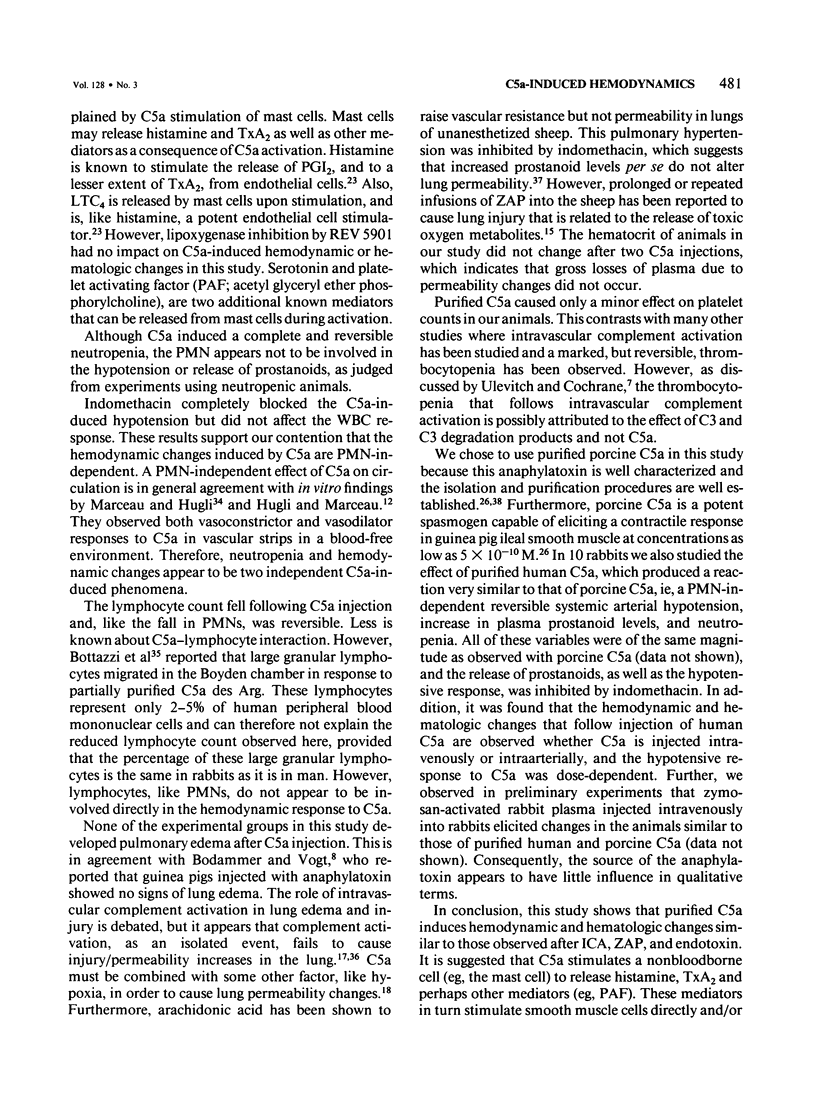
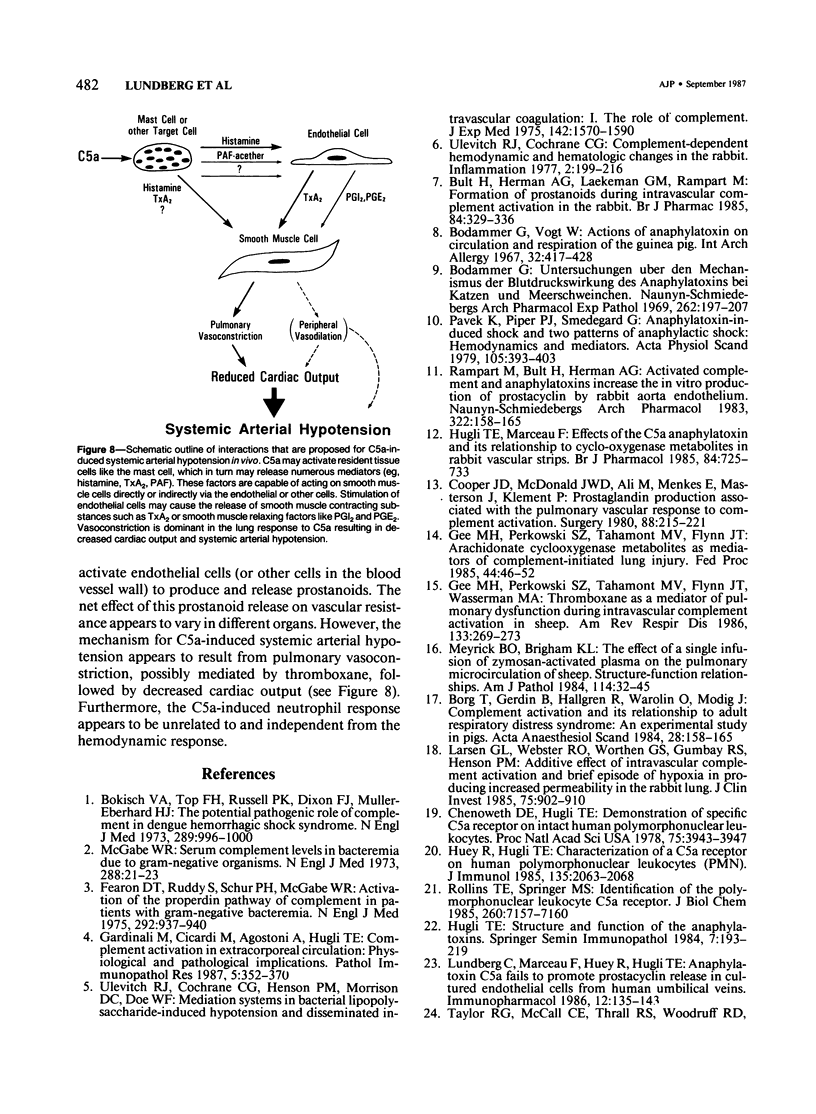
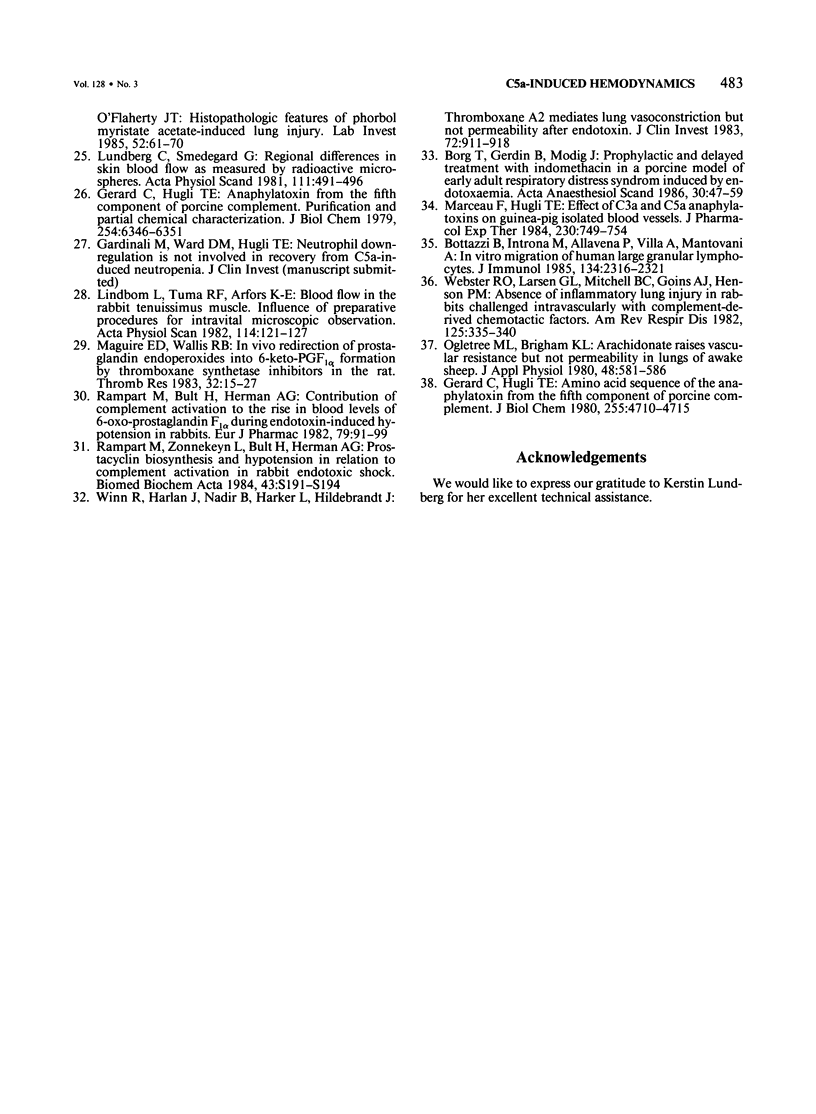
Selected References
These references are in PubMed. This may not be the complete list of references from this article.
- Bodammer G. Untersuchungen über den Mechanismus der Blutdruckwirkung des Anaphylatoxins bei Katzen und Meerschweinchen. Naunyn Schmiedebergs Arch Exp Pathol Pharmakol. 1969;262(2):197–207. [PubMed] [Google Scholar]
- Bodammer G., Vogt W. Actions of anaphylatoxin on circulation and respiration of the guinea pig. Int Arch Allergy Appl Immunol. 1967;32(5):417–428. doi: 10.1159/000229953. [DOI] [PubMed] [Google Scholar]
- Bokisch V. A., Top F. H., Jr, Russell P. K., Dixon F. J., Müller-Eberhard H. J. The potential pathogenic role of complement in dengue hemorrhagic shock syndrome. N Engl J Med. 1973 Nov 8;289(19):996–1000. doi: 10.1056/NEJM197311082891902. [DOI] [PubMed] [Google Scholar]
- Borg T., Gerdin B., Hällgren R., Warolin O., Modig J. Complement activation and its relationship to adult respiratory distress syndrome. An experimental study in pigs. Acta Anaesthesiol Scand. 1984 Apr;28(2):158–165. doi: 10.1111/j.1399-6576.1984.tb02034.x. [DOI] [PubMed] [Google Scholar]
- Borg T., Gerdin B., Modig J. Prophylactic and delayed treatment with indomethacin in a porcine model of early adult respiratory distress syndrome induced by endotoxaemia. Acta Anaesthesiol Scand. 1986 Jan;30(1):47–59. doi: 10.1111/j.1399-6576.1986.tb02366.x. [DOI] [PubMed] [Google Scholar]
- Bottazzi B., Introna M., Allavena P., Villa A., Mantovani A. In vitro migration of human large granular lymphocytes. J Immunol. 1985 Apr;134(4):2316–2321. [PubMed] [Google Scholar]
- Bult H., Herman A. G., Laekeman G. M., Rampart M. Formation of prostanoids during intravascular complement activation in the rabbit. Br J Pharmacol. 1985 Feb;84(2):329–336. doi: 10.1111/j.1476-5381.1985.tb12917.x. [DOI] [PMC free article] [PubMed] [Google Scholar]
- Chenoweth D. E., Hugli T. E. Demonstration of specific C5a receptor on intact human polymorphonuclear leukocytes. Proc Natl Acad Sci U S A. 1978 Aug;75(8):3943–3947. doi: 10.1073/pnas.75.8.3943. [DOI] [PMC free article] [PubMed] [Google Scholar]
- Cooper J. D., McDonald J. W., Ali M., Menkes E., Masterson J., Klement P. Prostaglandin production associated with the pulmonary vascular response to complement activation. Surgery. 1980 Aug;88(2):215–221. [PubMed] [Google Scholar]
- Fearon D. T., Ruddy S., Schur P. H., McCabe W. R. Activation of the properdin pathway of complement in patients with gram-negative of bacteremia. N Engl J Med. 1975 May 1;292(18):937–940. doi: 10.1056/NEJM197505012921802. [DOI] [PubMed] [Google Scholar]
- Gardinali M., Circardi M., Agostoni A., Hugli T. E. Complement activation in extracorporeal circulation: physiological and pathological implications. Pathol Immunopathol Res. 1986;5(3-5):352–370. doi: 10.1159/000157026. [DOI] [PubMed] [Google Scholar]
- Gee M. H., Perkowski S. Z., Tahamont M. V., Flynn J. T. Arachidonate cyclooxygenase metabolites as mediators of complement-initiated lung injury. Fed Proc. 1985 Jan;44(1 Pt 1):46–52. [PubMed] [Google Scholar]
- Gee M. H., Perkowski S. Z., Tahamont M. V., Flynn J. T., Wasserman M. A. Thromboxane as a mediator of pulmonary dysfunction during intravascular complement activation in sheep. Am Rev Respir Dis. 1986 Feb;133(2):269–273. doi: 10.1164/arrd.1986.133.2.269. [DOI] [PubMed] [Google Scholar]
- Gerard C., Hugli T. E. Amino acid sequence of the anaphylatoxin from the fifth component of porcine complement. J Biol Chem. 1980 May 25;255(10):4710–4715. [PubMed] [Google Scholar]
- Gerard C., Hugli T. E. Anaphylatoxin from the fifth component of porcine complement. Purification and partial chemical characterization. J Biol Chem. 1979 Jul 25;254(14):6346–6351. [PubMed] [Google Scholar]
- Huey R., Hugli T. E. Characterization of a C5a receptor on human polymorphonuclear leukocytes (PMN). J Immunol. 1985 Sep;135(3):2063–2068. [PubMed] [Google Scholar]
- Hugli T. E., Marceau F. Effects of the C5a anaphylatoxin and its relationship to cyclo-oxygenase metabolites in rabbit vascular strips. Br J Pharmacol. 1985 Mar;84(3):725–733. doi: 10.1111/j.1476-5381.1985.tb16155.x. [DOI] [PMC free article] [PubMed] [Google Scholar]
- Hugli T. E. Structure and function of the anaphylatoxins. Springer Semin Immunopathol. 1984;7(2-3):193–219. doi: 10.1007/BF01893020. [DOI] [PubMed] [Google Scholar]
- Larsen G. L., Webster R. O., Worthen G. S., Gumbay R. S., Henson P. M. Additive effect of intravascular complement activation and brief episodes of hypoxia in producing increased permeability in the rabbit lung. J Clin Invest. 1985 Mar;75(3):902–910. doi: 10.1172/JCI111790. [DOI] [PMC free article] [PubMed] [Google Scholar]
- Lundberg C., Marceau F., Huey R., Hugli T. E. Anaphylatoxin C5a fails to promote prostacyclin release in cultured endothelial cells from human umbilical veins. Immunopharmacology. 1986 Oct;12(2):135–143. doi: 10.1016/0162-3109(86)90039-1. [DOI] [PubMed] [Google Scholar]
- Lundberg C., Smedegård G. Regional differences in skin blood flow as measured by radioactive microspheres. Acta Physiol Scand. 1981 Apr;111(4):491–496. doi: 10.1111/j.1748-1716.1981.tb06768.x. [DOI] [PubMed] [Google Scholar]
- Maguire E. D., Wallis R. B. In vivo redirection of prostaglandin endoperoxides into 6-keto PGF1 alpha formation by thromboxane synthetase inhibitors in the rat. Thromb Res. 1983 Oct 1;32(1):15–27. doi: 10.1016/0049-3848(83)90150-0. [DOI] [PubMed] [Google Scholar]
- Marceau F., Hugli T. E. Effect of C3a and C5a anaphylatoxins on guinea-pig isolated blood vessels. J Pharmacol Exp Ther. 1984 Sep;230(3):749–754. [PubMed] [Google Scholar]
- McCabe W. R. Serum complement levels in bacteremia due to gram-negative organisms. N Engl J Med. 1973 Jan 4;288(1):21–23. doi: 10.1056/NEJM197301042880105. [DOI] [PubMed] [Google Scholar]
- Meyrick B. O., Brigham K. L. The effect of a single infusion of zymosan-activated plasma on the pulmonary microcirculation of sheep. Structure-function relationships. Am J Pathol. 1984 Jan;114(1):32–45. [PMC free article] [PubMed] [Google Scholar]
- Ogletree M. L., Brigham K. L. Arachidonate raises vascular resistance but not permeability in lungs of awake sheep. J Appl Physiol Respir Environ Exerc Physiol. 1980 Apr;48(4):581–586. doi: 10.1152/jappl.1980.48.4.581. [DOI] [PubMed] [Google Scholar]
- Pavek K., Piper P. J., Smedegård G. Anaphylatoxin-induced shock and two patterns of anaphylactic shock: hemodynamics and mediators. Acta Physiol Scand. 1979 Apr;105(4):393–403. doi: 10.1111/j.1748-1716.1979.tb00103.x. [DOI] [PubMed] [Google Scholar]
- Rampart M., Bult H., Herman A. G. Activated complement and anaphylatoxins increase the in vitro production of prostacyclin by rabbit aorta endothelium. Naunyn Schmiedebergs Arch Pharmacol. 1983 Mar;322(2):158–165. doi: 10.1007/BF00512390. [DOI] [PubMed] [Google Scholar]
- Rampart M., Bult H., Herman A. G. Contribution of complement activation to the rise in blood levels of 6-oxo-prostaglandin F1 alpha during endotoxin-induced hypotension in rabbits. Eur J Pharmacol. 1982 Apr 8;79(1-2):91–99. doi: 10.1016/0014-2999(82)90578-7. [DOI] [PubMed] [Google Scholar]
- Rollins T. E., Springer M. S. Identification of the polymorphonuclear leukocyte C5a receptor. J Biol Chem. 1985 Jun 25;260(12):7157–7160. [PubMed] [Google Scholar]
- Taylor R. G., McCall C. E., Thrall R. S., Woodruff R. D., O'Flaherty J. T. Histopathologic features of phorbol myristate acetate-induced lung injury. Lab Invest. 1985 Jan;52(1):61–70. [PubMed] [Google Scholar]
- Ulevitch R. J., Cochrane C. G. Complement-dependent hemodynamic and hematologic changes in the rabbit. Inflammation. 1977 Sep;2(3):199–216. doi: 10.1007/BF00917596. [DOI] [PubMed] [Google Scholar]
- Ulevitch R. J., Cochrane C. G., Henson P. M., Morrison D. C., Doe W. F. Mediation systems in bacterial lipopolysaccharide-induced hypotension and disseminated intravascular coagulation. I. The role of complement. J Exp Med. 1975 Dec 1;142(6):1570–1590. doi: 10.1084/jem.142.6.1570. [DOI] [PMC free article] [PubMed] [Google Scholar]
- Webster R. O., Larsen G. L., Mitchell B. C., Goins A. J., Henson P. M. Absence of inflammatory lung injury in rabbits challenged intravascularly with complement-derived chemotactic factors. Am Rev Respir Dis. 1982 Mar;125(3):335–340. doi: 10.1164/arrd.1982.125.3.335. [DOI] [PubMed] [Google Scholar]
- Winn R., Harlan J., Nadir B., Harker L., Hildebrandt J. Thromboxane A2 mediates lung vasoconstriction but not permeability after endotoxin. J Clin Invest. 1983 Sep;72(3):911–918. doi: 10.1172/JCI111062. [DOI] [PMC free article] [PubMed] [Google Scholar]


